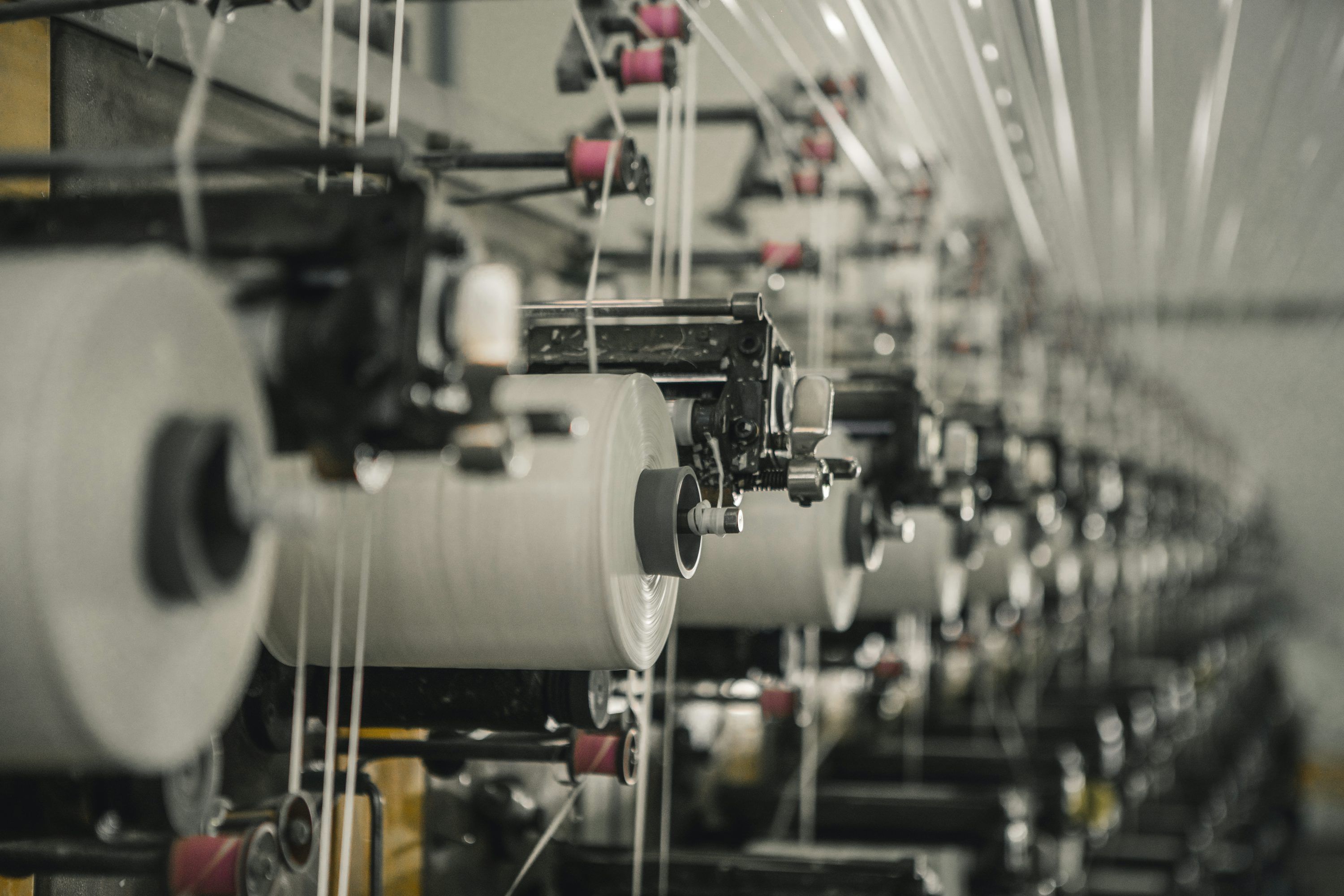
The textile industry contributes a lot to making an economy prosperous. It is one of the biggest sectors which has significant impacts on the environment, social factors, and innovation in any nation. There has been a lot of improvisation taking place in the textile industry world. New research and development in areas like the use of advanced technology in textile machinery promotes more output with less effort, minimizing errors and maximizing the production of clothing, home goods, industrial products, and many more.
Textile machinery has a great significance in the advancement of the textile industry. Globally, the global textile machinery market size is estimated at USD 33.21 billion in 2025 and is expected to reach USD 42.13 billion by 2030, at a CAGR of 4.87% during the forecast period (2025-2030). The more advanced equipment will generate great quality fabric in bulk quantities with less amount of time and at increased speed. Many textile companies are investing in premium used and new apparel machinery to fulfill the demand for automated textile production with eco-friendly practices.
In 2025, the textile industry isn't just reserved for business giants. Now, it's the time for small-scale businesses to own reasonably priced machinery available at lower prices. There are several industrial textile machinery available in the market right now that offer higher productivity, with low power consumption, and require less maintenance.
When investing in the textile industry, there is a wide range of machinery available for executing different mechanisms. It's not just about buying equipment; it's about analyzing its productivity over long periods of time. The right machine will increase productivity. It is essential to choose the right textile machinery for your business that keeps up with your company, production goals, and future expansion plans.
Following are some of the latest features of the most popular textile machines that you can purchase for business in 2025:
Weaving Machine: Used to interlace yarn for fabrics such as denim. There are water-jet, air-jet, and automated wrap-weaving machines available with touchscreen panels for higher productivity.
Embroidery Machine: Used to stitch different designs on a piece of cloth. You can buy the latest 3D puff embroidery and sequin options with auto-color changing, thread changing technology comes with a design upload feature.
Printing and Dyeing Equipment: Used to apply patterns, colors, dyes, and other impressions on the fabric. Now, you can buy digital, eco-friendly, automated printing and dyeing machines to reduce wastage.
Knitting Machine: For creating stretched, loopy fabric-like jerseys. The latest features include multiple knitting options with auto gauging so that it will be switched according to the fabric.
Defect Detection Machine: Used for scanning any errors, defects, and defaults in the final product. Now comes high resolution cameras with real time alerts to catch the error right away.
Following is a list of top textile machinery manufacturers in the world who are currently producing the best apparel machinery:
Rieter is a Swiss-based leader in spinning systems and technology. With a legacy spanning over 225 years, Rieter offers state-of-the-art machinery for fiber preparation, ring and compact spinning, and rotor spinning. Its innovation helps textile producers improve yarn quality, reduce energy consumption, and enhance profitability.
Headquartered in Japan, Murata Machinery is known for its automatic winders and twisting machines. Its precision engineering and automation capabilities make it ideal for high-volume textile operations. Murata's focus on smart factory integration supports efficiency, quality control, and workforce optimization in modern spinning mills.
A globally respected name, Toyota Industries manufactures weaving and spinning machinery trusted by mills worldwide. Their air-jet looms are industry benchmarks for speed and reliability. The company blends high production capacity with energy-saving features, ensuring smooth operations for businesses of all sizes.
Based in Italy, Itema Group specializes in weaving solutions, offering rapier, air-jet, and projectile looms. It's one of the few companies to provide all three technologies. Known for durability and cutting-edge features, Itema supports both technical textiles and fashion fabric manufacturers globally.
Toray is a Japanese conglomerate well-known for innovation in fibers and polymer science. In textile machinery, it focuses on advanced weaving and finishing systems. Toray's machines are eco-conscious and built for high performance, serving applications in apparel, automotive, and industrial textiles.
India's Arvind Limited is not only a major textile producer but also a manufacturer of fabric processing and finishing equipment. With a strong focus on sustainability and denim production, Arvind supports domestic and global textile units looking for cost-effective, durable machinery.
Staubli, a Swiss technology firm, is renowned for high-end weaving automation, including shedding systems, jacquard machines, and automatic drawing-in devices. Their systems offer excellent precision, speed, and reliability, making them essential in both standard and technical textile production lines.
Following are the best B2B websites to meet with textile machinery manufacturers and get price quotations for the latest machinery:
Tradewheel is the ideal platform for connecting with suppliers and distributors of the latest textile machinery. The website is known for its genuine supplier network, which has been a part of this platform for quite some time. These wholesale apparel machinery manufacturers are providing great services and have listed the premium and latest textile machinery that are high functioning and affordable. You can find used and new textile machinery at Tradewheel.com after exploring the assorted range. From weaving machines to coloring equipment, you can get exactly what you need to start your business. The platform offers great networking opportunities to help you form a long-term business relationship.
Alibaba.com is the biggest B2B website to source the latest textile machinery for business. The platform serves buyers from different parts of the world who are interested in starting their new business in the textile industry. Here, you can use high-filter tools to find apparel machinery from reputed manufacturers and distributors. New or used, you can get the best prices depending on your budget restrictions. Alibaba.com provides business solutions to millions of buyers every day and helps them connect with verified suppliers who offer great value for their money.
Another website to get the best price quotes for textile machinery is Made-In-China. Chinese equipment is highly affordable and offers great productivity results. You can find several wholesale suppliers from China on this platform who can help you find the best apparel and textile machinery for your business. You can explore the wide range of multiple machinery used and new, and their spare parts to compare price and other attributes. The website also features a messaging option, helping you convey the customization requirements before getting the deal done.
Connecting with the apparel machinery supplier for business isn't just a one-time but a long-term commitment that should be made with the right choices. Go through the following checklist to choose the proper manufacturer for your investments in textile machinery.
Always pick sellers who allow you to check if the price for the textile machinery is worth it. Check the machine's condition before asking for clear images.
Check supplier's certifications for the standard of quality assurance to avoid conflicts.
Ask if they offer after-sales services for apparel machinery maintenance.
Connect with sellers who offer you customization options.
Explore and compare various suppliers on different parameters to get the best rates.
Purchasing brand-new textile machinery can be an expense ranging from $ 10,000 to $ 50,000. It is totally dependent on the type, condition, size, and automated level of the machine. Specialized textile machinery for specific fabrics, such as denim, is always more pricey than regular ones.
The type of machine is a key factor that contributes to the pricing of textile machinery. Machines like weaving are generally more expensive than dyeing. It also depends on the country of the textile machinery and its origin. Typically, European and Japanese textile machinery models are highly priced because of their innovative technology. To save money, it is necessary to look for alternatives, such as textile machinery made in India and China, that are affordable. These machines may require more maintenance than the other ones but could provide excellent results.
The price for textile machinery also fluctuates when the machine is brand new versus the used equipment. Discussing maintenance costs, shipments, and other additional expenses with the seller provides a rough estimate.
To start a textile business, you need to first decide your niche. You can start by selecting items such as garments, fabrics, or machinery. You have to create a business plan and arrange funding. Choose a location, register your business, and build supplier connections. If you plan to become a textile machinery distributor, then invest in the right machinery and skilled staff. Start small and focus on quality. You also have to market your products online and offline. It is a better practice to keep track of trends, and customers need to grow steadily and stay competitive in the market.
The textile industry is one of the largest industries in the world and is responsible for a significant source of income, employment, and development in the country. It is a lucrative industry that holds a lot of scope for newcomers. We have mentioned the best textile machinery manufacturers in the world who are responsible for innovation in this field. Furthermore, we have added top B2B websites to get real-time price quotations for premium and latest textile machinery.
